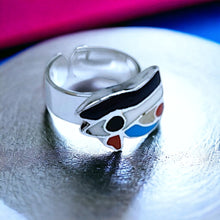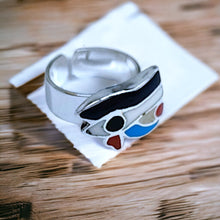
The Eye of Horus Adjustable Silver Ring: A timeless symbol of protection and wisdom, inspired by the ancient Egyptian deity Horus, symbolizing power and health. Crafted with sterling silver, its adjustable design ensures a perfect fit for every wearer, echoing the enduring legacy of Egyptian culture and spirituality.
- History: Ancient Egyptian symbol dating back to 3000 BCE, represents protection, royal power, and good health.
- Spiritually: Associated with the Egyptian god Horus, symbolizing healing, regeneration, and divine vision.
- Talisman: Believed to ward off evil and bring blessings, used for protection and spiritual guidance.
- Handmade: Crafted with care and attention to detail, each ring is unique and carries the artisan's touch.
- Healing: Thought to promote mental clarity, intuition, and spiritual growth, aiding in emotional balance.
- Material - Silver: Sterling silver used for its purity and symbolic significance, enhancing the ring's spiritual properties.
- Symbolism: Eye of Horus represents wisdom, protection, and insight, connecting the wearer with divine energies.
- How to Wear: Adjustable design allows for comfortable and customizable fit, wear on any finger as a daily reminder of protection and spiritual guidance.
History Side For Those Who Are Interested
The Eye of Horus, often referred to as the Wedjat or Udjat, holds a significant place in ancient Egyptian mythology, religious beliefs, and symbolism. Its history spans millennia, and its cultural importance endured throughout various dynasties of ancient Egypt.
The Eye of Horus is closely associated with Horus, the falcon-headed god who was one of the most significant deities in the Egyptian pantheon. Horus was revered as the god of the sky, war, and protection, among other attributes. According to mythology, Horus was the son of Osiris, the god of the afterlife, and Isis, the goddess of magic and motherhood.
The origin of the Eye of Horus dates back to the mythological conflict between Horus and his uncle, Set (or Seth), who murdered Horus's father, Osiris, and sought to usurp the throne of Egypt. In one version of the myth, Horus loses his left eye during a battle with Set. The eye is later restored by the god Thoth, the god of wisdom and writing, and becomes a symbol of healing, protection, and restoration.
The Eye of Horus symbolizes the concept of wholeness, completeness, and divine protection. It is often depicted as a stylized eye with distinctive markings. These markings are believed to represent the fractions used by ancient Egyptians in mathematics and medicine. Each part of the eye corresponds to a fraction, with the whole eye symbolizing unity and perfection.
The Eye of Horus had profound religious and protective significance in ancient Egyptian culture. It was believed to have protective and healing powers, warding off evil spirits and providing guidance and blessings to the wearer. It was commonly used in amulets, jewelry, and funerary objects to safeguard the deceased in the afterlife.
In addition to its protective qualities, the Eye of Horus was also associated with the concept of divine perception and insight. It was believed to grant wisdom, clarity of vision, and spiritual enlightenment to those who invoked its power.
Over time, the symbolism of the Eye of Horus evolved and was assimilated into various aspects of Egyptian culture and religious practices. Its influence extended beyond Egypt and influenced neighboring civilizations in the ancient Near East.
Today, the Eye of Horus continues to be a potent symbol in modern Egyptian culture and has found its way into contemporary art, jewelry, and popular culture around the world. Its enduring legacy serves as a testament to the profound impact of ancient Egyptian beliefs and mythology on human civilization.









